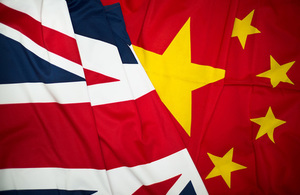UK-China research partnership strengthens with new research programmes tackling global challenges
The UK Research Councils have announced a number of research programmes in partnership with Chinese funders to tackle major global challenges, as part of the State visit by Chinese President Xi Jinping to the UK this week.

UK-China research partnership strengthens with new research programmes tackling global challenges
A joint fund of £9 million from the Medical Research Council (MRC), the Biotechnology and Biological Sciences Research Council (BBSRC) and the Economic and Social Research Council (ESRC) with the National Natural Science Foundation of China (NSFC), will support research on antimicrobial resistance - a huge and complex problem for healthcare and agriculture. The UK contribution (£4.5million) is channelled through the Newton Fund, an initiative launched in April 2014 intended to strengthen research and innovation partnerships between the UK and emerging knowledge economies.
Researchers from UK and Chinese universities are also collaborating on four new projects to work towards achieving low carbon cities in the UK and China. The projects will receive over £3 million in funding from the Engineering and Physical Sciences Research Council (EPSRC), with matched equivalent resources from NSFC. Funded under the Low Carbon Cities programme, the projects will encourage collaboration between leading UK and Chinese academics, combining research to reduce the carbon emissions of existing technologies. They will also deliver fundamental research into alternative energy sources and a reduction of energy demand, all with a focus on future urban environments.
These cross-Council collaborations with NSFC have been facilitated by the Research Councils UK (RCUK) China office based in Beijing. As a result, the value of UK-China Research programmes facilitated by RCUK China has increased from £6.5 million in 2008 to now more than £160 million.
Professor Jane Elliott, RCUK’s International Champion, said:
The Research Councils have established strong partnerships with all the key Chinese research funding agencies. This year alone, we launched 12 joint programmes with a UK investment of more than £30 million and matched equivalent resources from China. I am extremely pleased to see that research is so high on the Chinese President’s agenda during the State visit.
Professor Liu Congqiang, Vice President, the National Natural Science Foundation of China (NSFC) said:
Our collaboration with RCUK is an essential part of China’s relationship with the UK. Over the past 6 years, we have built a trusting relationship with RCUK and jointly supported excellent research in priority areas that look to solve the environmental, economic and social challenges facing the world today. It is only through a joint research effort that we can attain real solutions in these areas of critical importance.
Further information
Contact:
Katie Clark Tel: 01793 444387 or email: Katie Clark
Notes to editors
-
The Natural Environment Research Council (NERC) is also working with NSFC on two programmes on research into air pollution and human health with MRC and critical zone observatories, further details of this work will be announced in November 2015.
-
The Economics and Social Research Council has also recently announced the results of the Urban Transformations joint call with NSFC, which looks to explore the recent transformation of fast-developing urban regions of China.
-
The fourth UK-China Energy Dialogue took place at One Whitehall Place, London on 19 October. The event was opened by Amber Rudd, UK Secretary of State for Energy and Climate Change, and Nur Bekri, Administrator of the Chinese National Energy Administration. The dialogue included four breakout sessions, well attended by UK and Chinese academia and business representatives, on energy markets reform, offshore wind cost reduction, nuclear skills partnerships, and new energy technologies. Dr Kathryn Magnay, Head of the RCUK Energy Programme, gave a presentation in the new technologies session on Trends in UK-China collaboration in New Energy Innovation, highlighting some of our collaborations with China and the importance of these international collaborations.
-
Research Councils UK (RCUK) is the strategic partnership of the UK’s seven Research Councils. Our collective ambition is to ensure the UK remains the best place in the world to do research, innovate and grow business. The Research Councils are central to delivering research and innovation for economic growth and societal impact. Together, we invest £3 billion in research each year, covering all disciplines and sectors, to meet tomorrow’s challenges today. Our investments create new knowledge through: funding research excellence; responding to society’s challenges; developing skills, leadership and infrastructure; and leading the UK’s research direction. We drive innovation through: creating environments and brokering partnerships; co-delivering research and innovation with over 2,500 businesses, 1,000 of which are SMEs; and providing intelligence for policy making. Find out more about our work at www.rcuk.ac.uk. The seven UK Research Councils are: * Arts & Humanities Research Council (AHRC) * Biotechnology & Biological Sciences Research Council (BBSRC) * Economic & Social Research Council (ESRC) * Engineering & Physical Sciences Research Council (EPSRC) * Medical Research Council (MRC) * Natural Environment Research Council (NERC) * Science & Technology Facilities Council (STFC)
-
RCUK China was the first overseas team set up outside of Europe by the UK Research Councils. Since 2007, the team has built excellent relationships with all the major national funding agencies in China, pioneering the facilitation of UK-China research partnerships across areas of natural, physical and medical sciences, engineering, social science, arts and the humanities. To date, RCUK China has facilitated over £160 million in co-funded programmes supporting 78 UK-China research projects that have involved more than 60 universities and 50 industry partners in both countries. RCUK China currently has six members of staff and is co-located in the British Embassy in Beijing.